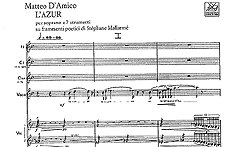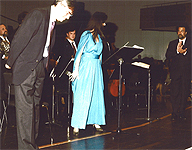 Cinque
liriche su poesie di Stéphane Mallarmé per soprano e sette
strumenti (1989)
Cinque
liriche su poesie di Stéphane Mallarmé per soprano e sette
strumenti (1989)
I. Le vierge, le vivace et le bel aujourd’hui
II. Ame au si clair foyer
III. La lune s’attristait
IV. L’espace à soi pareil
V. L’Azur
Luisa Castellani, soprano – Gruppo Musica d’Oggi – Fabio Maestri, direttore
L’Azur è nato nel 1988 dall’incontro
con Stéphane Mallarmé e con il suo straordinario mondo
poetico fatto di ermetica ambiguità e di sofferta ironia, dove
trionfa incontrastato il lavoro sottile sulla parola, quel ‘giuoco
supremo’ che per il poeta è l’unica possibilità
di vita al riparo dalla morte. Dopo L’Azur sono venuti alla luce,
sempre su testi di Mallarmé, il Monologue d’un phaune,
1989, per voce recitante e pianoforte, e Sonnets et Rondels, 1993, per
baritono e orchestra). I cinque brani di cui si compone L’Azur
si basano su altrettante poesie o frammenti di poesie che toccano alcuni
fra i temi ricorrenti in Mallarmé, come l’angoscia di fronte
ad una Bellezza trascendente, fredda, e irraggiungibile (I e V), la
cosmica solitudine del poeta (IV), la figura femminile, ora misteriosa
e impalpabile anima dell’aldilà (II), ora fiabesca e lucente
apparizione onirica (III). Il brano qui riprodotto è il quinto
ed ultimo della raccolta, ed è basato sulle ultime quattro strofe
della poesia L’Azur, scritta nel 1864 e inserita nella raccolta
Parnasse contemporain: alla “straziante impotenza” dei versi
di Mallarmé fa eco una scrittura vocale nervosa e imprevedibile,
costantemente protesa verso una fusione espressiva del senso musicale
e di quello poetico. 
L’Azur is based on five poems or fragments by Stéphane Mallarmé, whose work strongly influenced D’Amico since 1988 (after L’Azur he composed Monologue d’un phaune, 1989, for speaking voice and piano, and Sonnets et Rondels, 1993, for baritone and orchestra). Many important elements of Mallarmè’s poetics captured the attention of the composer: first of all, the subtil work around the word and the verse, the ‘supreme play’ which is for the poet the only opportunity of life against dead. The title of the whole piece is borrowed from the poem of the same name published in 1864 and later collected in the Parnasse contemporain, a poem on “agonizing impotence”, the last four strophes of which D’Amico uses to conclude this cycle with the repeated cry of “l’Azur” (this is the piece that can be heard here, the fifth of the whole cycle). The vocal part closely follows the row of poetic Mallarmé’s imagery and constantly seeks after expressive fusion between musical and poetic meanings.
V.
– Le Ciel est mort. – Vers toi j’accours! Donne, ô
matière,
L’oubli de l’Idéal cruel et du Péché
A ce martyr qui vient partager la litière
Où le bétail heureux des hommes est couché,
Car j’y veux, puisque enfin ma cervelle, vidée
Comme le pot de fard gisant au pied d’un mur,
N’a plus l’art d’attifer la sanglotante idée,
Lugubrement bâiller vers un trépas obscur…
En vain! L’Azur triomphe, et je l’entends qui ch’ante
Dans le cloches, Mon âme, il se fait voix pour plus
Nous faire peur avec sa victoire méchante,
Et du métal vivant sort en bleus angélus!
Il roule par la brume, ancien et traverse
Ta native agonie ainsi qu’un glaive sûr;
Où fuir dans la rivolte inutile et perverse?
Je suis hanté. L’Azur! L’Azur! L’Azur! L’Azur!